In this insightful interview, Milou Pietersz, a content marketing strategist and CEO of Simply Media and Advertising, shares her expertise increatin ...
You might consider targeting a niche, such as focusing on home service companies.
We earn commissions if you shop through the links below. Read more
Written by: Carolyn Young
Carolyn Young is a business writer who focuses on entrepreneurial concepts and the business formation. She has over 25 years of experience in business roles, and has authored several entrepreneurship textbooks.
Edited by: David Lepeska
David has been writing and learning about business, finance and globalization for a quarter-century, starting with a small New York consulting firm in the 1990s.
Published on April 21, 2023

Investment range
$1,000 - $3,300
Revenue potential
$60,000 - $300,000 p.a.
Time to build
0-3 months
Profit potential
$45,000 - $120,000 p.a.
Industry trend
Growing
Commitment
Flexible
Important elements to think about when starting your social media marketing agency:
Interactive Checklist at your fingertips—begin your social media marketing agency today!
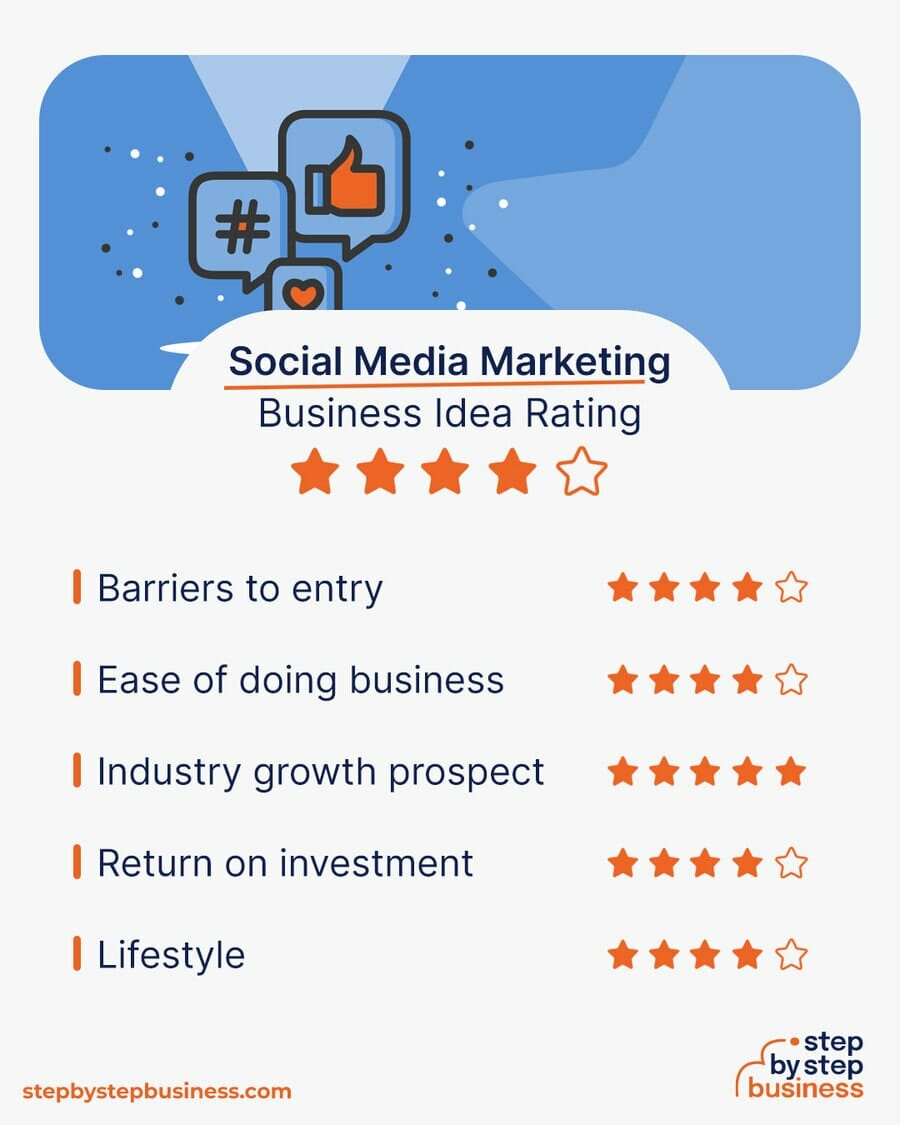
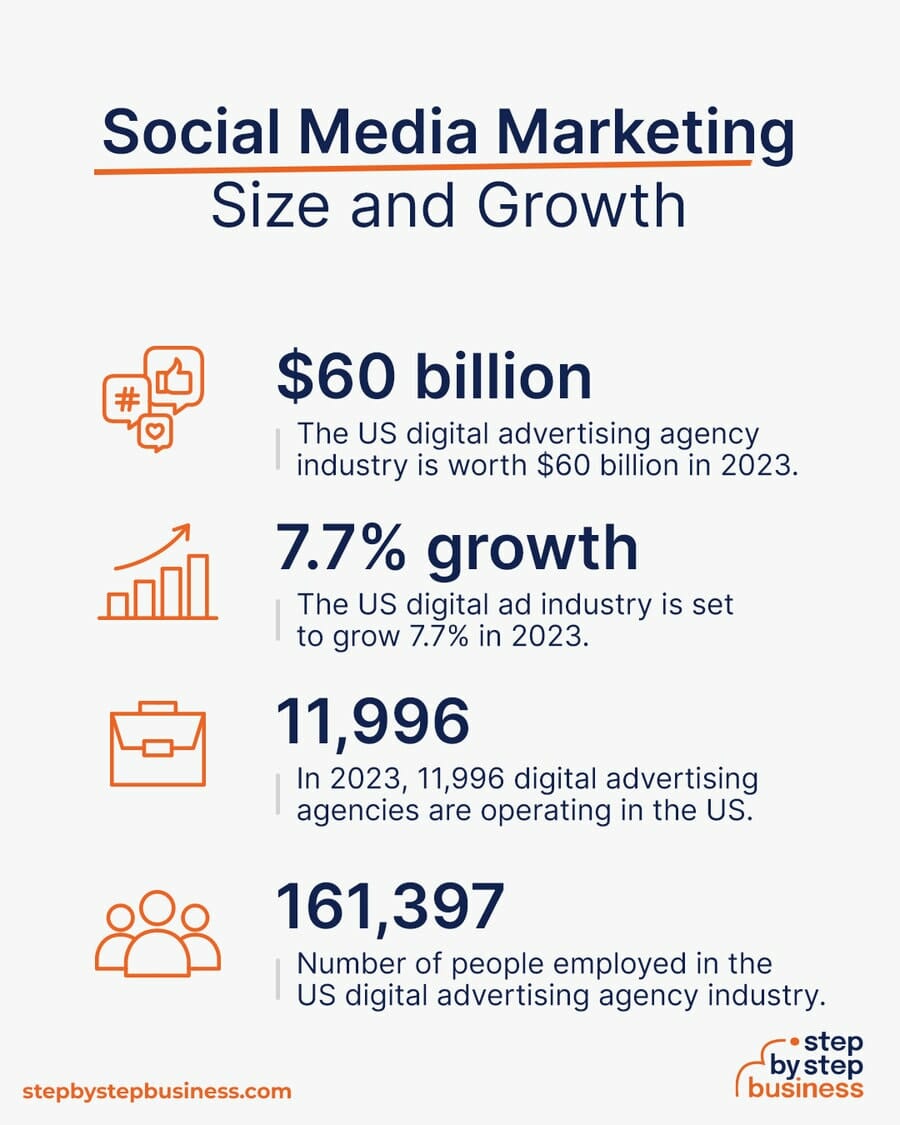
Social media marketing makes up more than 30% of the digital advertising market.
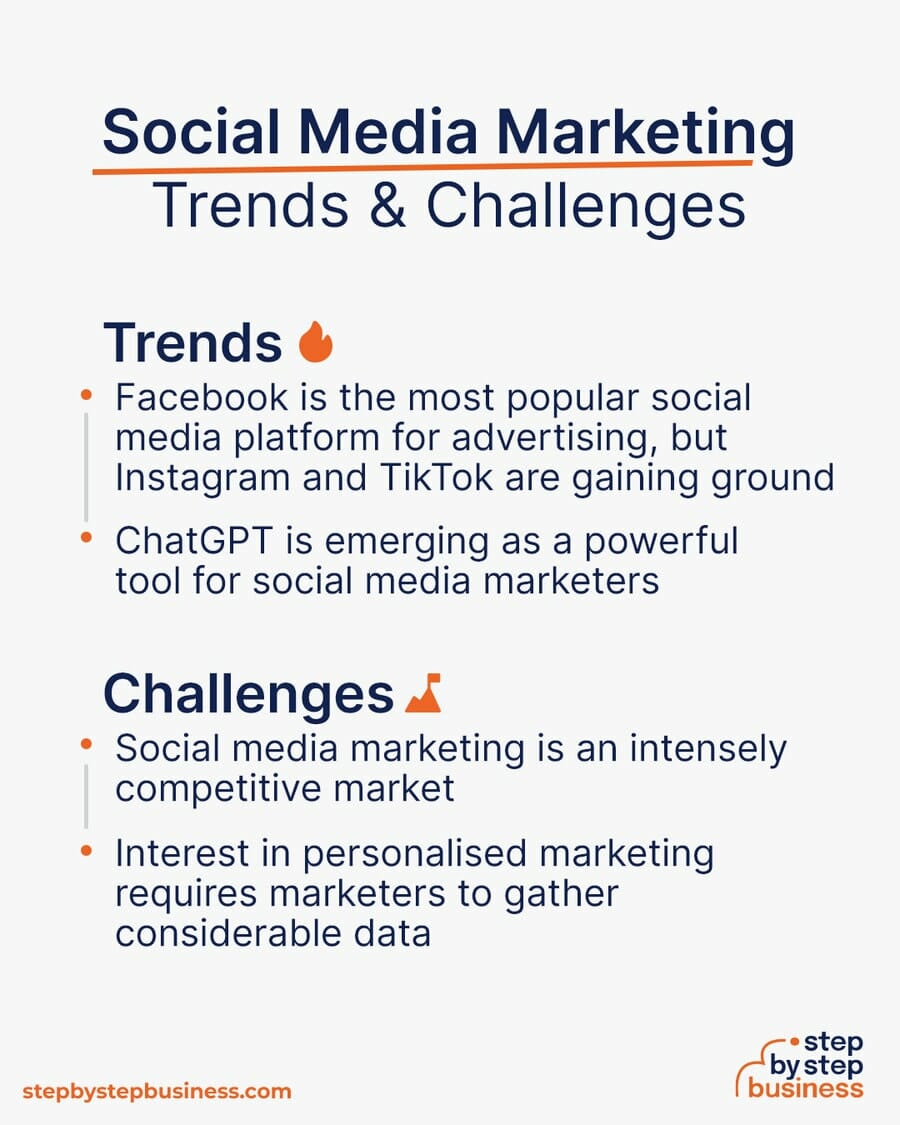
Trends
Challenges
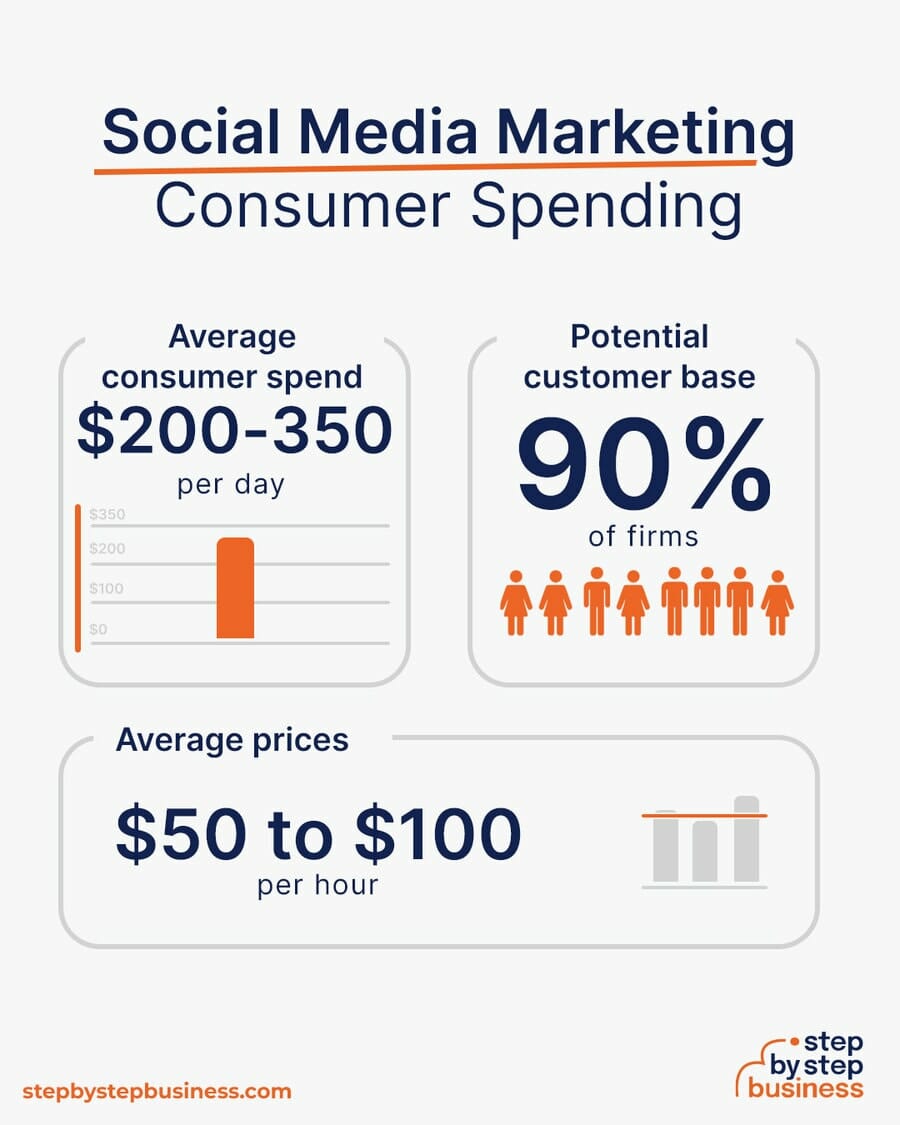

Startup costs for a social media marketing agency range from $1,500 to $3,300. The largest expense is a computer.
You’ll need a handful of items to successfully launch your social media business, including:
| Start-up Costs | Ballpark Range | Average |
|---|---|---|
| Setting up a business name and corporation | $100 - $500 | $300 |
| Business licenses and permits | $100 - $300 | $200 |
| Insurance | $100-$500 | $300 |
| Initial Marketing Budget | $200 - $500 | $350 |
| Computer | $500 - $1,500 | $1,000 |
| Total | $1,000 - $3,300 | $2,150 |
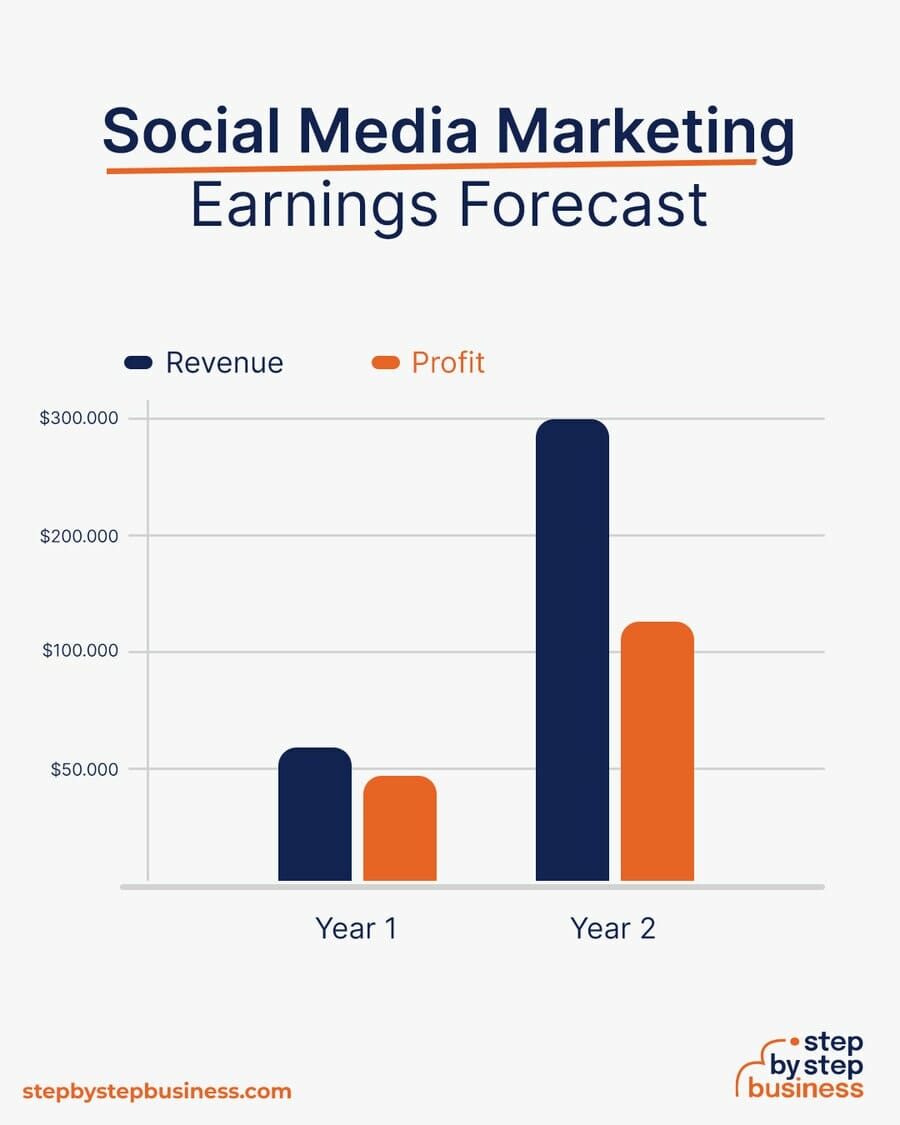
Generally, you’ll charge your customers monthly for ongoing campaigns, fees for which could range from $500 to $5,000. These calculations assume an average rate of $2,500 per month.
Your profit margin after marketing and Wi-Fi costs should be about 90%. In your first year or two, you could work from home for two clients, bringing in $60,000 in revenue. This would mean $45,000 in profit, assuming that 90% margin.
As you gain traction, you could attract 10 clients. At this stage, you might have an office and hire staff, reducing your margin to around 40%. With annual revenue of $300,000, you’d make a tidy profit of $120,000.
There are a few barriers to entry for a social media marketing agency. Your biggest challenges will be:
Now that you know what’s involved in starting a social media marketing agency, it’s a good idea to hone your concept in preparation to enter a competitive market.
Begin by evaluating your own strengths, expertise, and resources. Consider what aspects of social media management you excel at – content creation, strategy development, analytics, etc.
Research social media marketing agencies in your area to examine their services, price points, and customer reviews.
This should identify areas where you can improve your business, gain a competitive edge and make better business decisions.
You’re looking for a market gap to fill. For instance, maybe the local market is missing an agency that builds a social media presence for real estate agencies, or that offers social media management and content marketing.
You might consider targeting a niche, such as focusing on home service companies.
Look into what potential clients need and what’s trending in the market. Are businesses looking for more video content, influencer collaborations, or analytics-driven strategies?
Some services tend to be more profitable due to high demand and the ability to scale. These include:
Instead of offering individual services, consider bundling them into packages. For example, a basic package could include content creation and posting, while a premium package could add in strategy development and analytics.
If you choose to specialize in a single platform, it allows you to develop deep expertise and offer highly specialized services. For instance, mastering Facebook’s advertising and community engagement tools, leveraging Instagram’s visual storytelling and influencer networks, or tapping into TikTok’s unique content trends and viral marketing strategies can set your agency apart as a niche expert.
Your target audience will be business owners, who are best found on LinkedIn. If your marketing focuses on a certain industry, connect with people in that industry through related events, forums, and websites.
Pricing your social media services will depend on the extent of the services offered and the time it takes, and could range from $500 to $5,000 per month. Once you have an office and staff, your costs will also be a factor.
Once you know your costs, use our profit margin calculator to determine your mark-up and final price points. Remember, the prices you use at launch should be subject to change if warranted by the market.
In the early stages, you may want to run your business from home to keep costs low. But as your business grows, you’ll likely need to hire workers for various roles and may need to rent out an office space. You can find commercial space to rent in your area on sites such as Craigslist, Crexi, and Instant Offices.
Here are some ideas for brainstorming your business name:
Once you’ve got a list of potential names, visit the website of the US Patent and Trademark Office to make sure they are available for registration and check the availability of related domain names using our Domain Name Search tool below. Using “.com” or “.org” sharply increases credibility, so it’s best to focus on these.
Finally, make your choice among the names that pass this screening and go ahead and reserve your business name with your state, start the trademark registration process, and complete your domain registration and social media account creation.
Your business name is one of the key differentiators that sets your business apart. Once you pick a name, reserve it and start with the branding, it’s hard to switch to a new name. So be sure to carefully consider your choice before moving forward.
Here are the key components of a business plan:

If you’ve never created a business plan, it can be an intimidating task. You might consider hiring a business plan specialist to create a top-notch business plan for you.
Registering your business is an absolutely crucial step — it’s the prerequisite to paying taxes, raising capital, opening a bank account, and other guideposts on the road to getting a business up and running.
Plus, registration is exciting because it makes the entire process official. Once it’s complete, you’ll have your own business!
Your business location is important because it can affect taxes, legal requirements, and revenue. Most people will register their business in the state where they live, but if you are planning to expand, you might consider looking elsewhere, as some states could offer real advantages when it comes to social media marketing agencies.
If you’re willing to move, you could really maximize your business! Keep in mind, it’s relatively easy to transfer your business to another state.
Business entities come in several varieties, each with its pros and cons. The legal structure you choose for your social media marketing agency will shape your taxes, personal liability, and business registration requirements, so choose wisely.
Here are the main options:

We recommend that new business owners choose LLC as it offers liability protection and pass-through taxation while being simpler to form than a corporation. You can form an LLC in as little as five minutes using an online LLC formation service. They will check that your business name is available before filing, submit your articles of organization, and answer any questions you might have.
Choose Your State
The final step before you’re able to pay taxes is getting an Employer Identification Number, or EIN. You can file for your EIN online or by mail or fax: visit the IRS website to learn more. Keep in mind, if you’ve chosen to be a sole proprietorship, you can simply use your social security number as your EIN.
Once you have your EIN, you’ll need to choose your tax year. Financially speaking, your business will operate in a calendar year (January–December) or a fiscal year, a 12-month period that can start in any month. This will determine your tax cycle, while your business structure will determine which taxes you’ll pay.
The IRS website also offers a tax-payers checklist, and taxes can be filed online.
It is important to consult an accountant or other professional to help you with your taxes to ensure you are completing them correctly.
Securing financing is your next step and there are plenty of ways to raise capital:
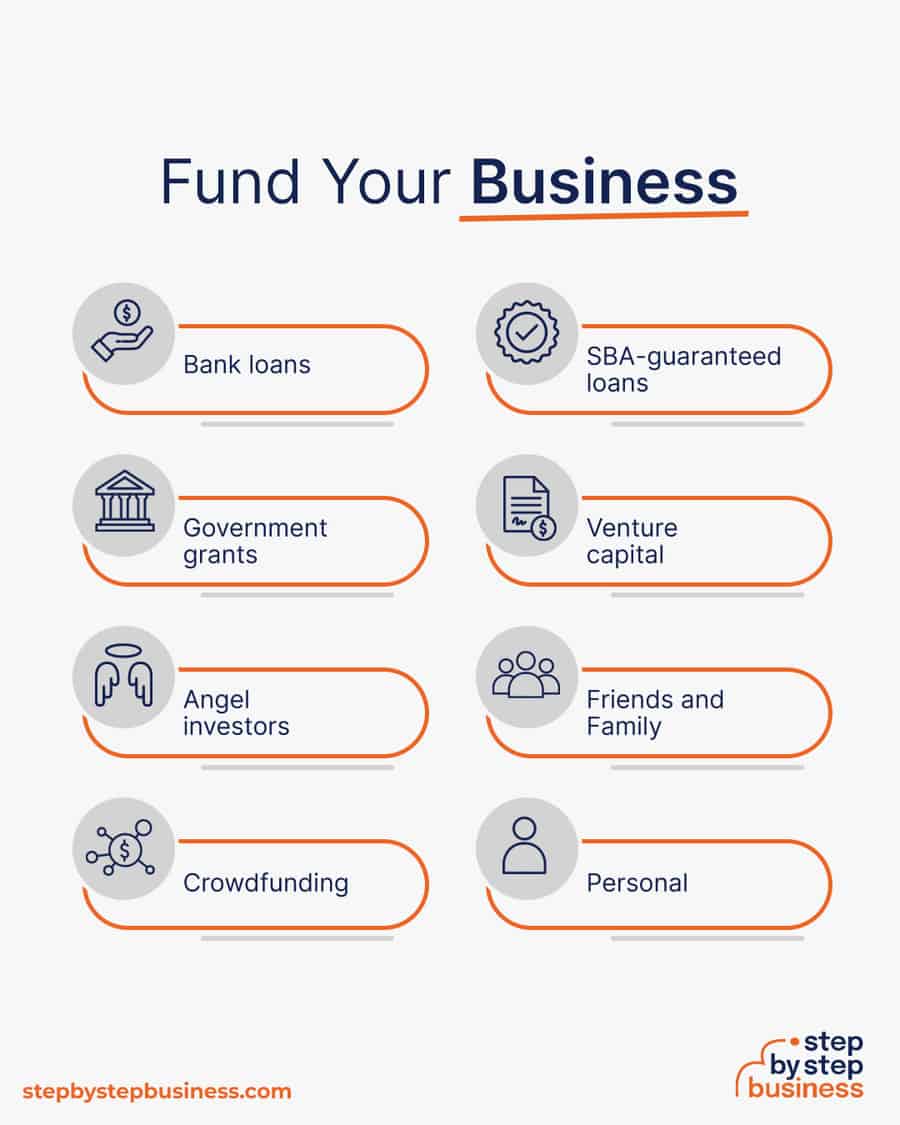
Bank and SBA loans are probably the best option, other than friends and family, for funding a social media marketing business. You might also try crowdfunding if you have an innovative concept. At some point, you might even be able to attract angel investors or venture capital.
Starting a social media marketing business requires obtaining a number of licenses and permits from local, state, and federal governments.
Federal regulations, licenses, and permits associated with starting your business include doing business as (DBA), health licenses and permits from the Occupational Safety and Health Administration (OSHA), trademarks, copyrights, patents, and other intellectual properties, as well as industry-specific licenses and permits.
You may also need state-level and local county or city-based licenses and permits. The license requirements and how to obtain them vary, so check the websites of your state, city, and county governments or contact the appropriate person to learn more.
You could also check this SBA guide for your state’s requirements, but we recommend using MyCorporation’s Business License Compliance Package. They will research the exact forms you need for your business and state and provide them to ensure you’re fully compliant.
This is not a step to be taken lightly, as failing to comply with legal requirements can result in hefty penalties.
If you feel overwhelmed by this step or don’t know how to begin, it might be a good idea to hire a professional to help you check all the legal boxes.
Before you start making money, you’ll need a place to keep it, and that requires opening a bank account.
Keeping your business finances separate from your personal account makes it easy to file taxes and track your company’s income, so it’s worth doing even if you’re running your social media marketing business as a sole proprietorship. Opening a business bank account is quite simple, and similar to opening a personal one. Most major banks offer accounts tailored for businesses — just inquire at your preferred bank to learn about their rates and features.
Banks vary in terms of offerings, so it’s a good idea to examine your options and select the best plan for you. Once you choose your bank, bring in your EIN (or Social Security Number if you decide on a sole proprietorship), articles of incorporation, and other legal documents and open your new account.
Business insurance is an area that often gets overlooked yet it can be vital to your success as an entrepreneur. Insurance protects you from unexpected events that can have a devastating impact on your business.
Here are some types of insurance to consider:

As opening day nears, prepare for launch by reviewing and improving some key elements of your business.
Being an entrepreneur often means wearing many hats, from marketing to sales to accounting, which can be overwhelming. Fortunately, many websites and digital tools are available to help simplify many business tasks.
You may want to use industry-specific software, such as Cloud Campaign or Kontentino, to manage your posts, reporting, metrics, and design.
Website development is crucial because your site is your online presence and needs to convince prospective clients of your expertise and professionalism. You can create your own website using services like WordPress, Wix, or Squarespace.
This route is very affordable, but figuring out how to build a website can be time-consuming. If you lack tech-savvy, you can hire a web designer or developer to create a custom website for your business.
The website should showcase your services, case studies, and client testimonials.
Your customers are unlikely to find your website, however, unless you follow Search Engine Optimization (SEO) practices. SEO will help your website appear closer to the top in relevant search results, a crucial element for increasing sales.
Make sure that you optimize calls to action on your website. Experiment with text, color, size, and position of calls to action such as “Contact Now” or “Request a Quote”. This can sharply increase purchases.
Here are some effective marketing strategies specifically tailored for a social media agency:

Unique selling propositions, or USPs, are the characteristics of a product or service that sets it apart from the competition. Customers today are inundated with buying options, so you’ll have a real advantage if they are able to quickly grasp how your social media marketing meets their needs or wishes. It’s wise to do all you can to ensure your USPs stand out on your website and in your marketing and promotional materials, stimulating buyer desire.
Global pizza chain Domino’s is renowned for its USP: “Hot pizza in 30 minutes or less, guaranteed.” Signature USPs for your social media marketing business could be:
You may not like to network or use personal connections for business gain. But your personal and professional networks likely offer considerable untapped business potential. Maybe that Facebook friend you met in college is now running a social media marketing business, or a LinkedIn contact of yours is connected to dozens of potential clients. Maybe your cousin or neighbor has been working in social media marketing for years and can offer invaluable insight and industry connections.
The possibilities are endless, so it’s a good idea to review your personal and professional networks and reach out to those with possible links to or interest in social media marketing. You’ll probably generate new customers or find companies with which you could establish a partnership.
If you’re starting out small from a home office, you may not need any employees. But as your business grows, you will likely need workers to fill various roles. Potential positions for a social media marketing business include:
At some point, you may need to hire all of these positions or simply a few, depending on the size and needs of your business. You might also hire multiple workers for a single role or a single worker for multiple roles, again depending on need.
Free-of-charge methods to recruit employees include posting ads on popular platforms such as LinkedIn, Facebook, or Jobs.com. You might also consider a premium recruitment option, such as advertising on Indeed, Glassdoor, or ZipRecruiter. Further, if you have the resources, you could consider hiring a recruitment agency to help you find talent.
Social media has taken the world by storm and now dominates marketing. Companies spend billions on social media ads, creating a ripe opportunity for new agencies. Starting a social media marketing agency doesn’t cost much and it could be hugely lucrative.
Now that you understand the business side, you’re ready to hit the ground running and ride the social media train to serious success!
A social media marketing agency can be very profitable. Customers pay up to $5,000 per month for full-service social media campaigns.
There’s no limit to how large a social media marketing agency can grow as long as you hire enough staff to handle a large client load. You don’t have to be in the same area as the companies you work for, so your market is global.
You can start a social media marketing agency as a side hustle and just work for a few clients. You can create posts and use software that will post them for you at scheduled times when you’re not available.
A social media marketing agency helps companies develop a social media strategy then manages the implementation.

Published on March 27, 2024
In this insightful interview, Milou Pietersz, a content marketing strategist and CEO of Simply Media and Advertising, shares her expertise increatin ...
Read Now

Published on December 1, 2022
Instagram is a great app for sharing and connecting, showing off your photos, and keeping in touch with friends. With more than 1.4 billion users,it ...
Read Now

Published on November 4, 2022
The importance of design cannot be overemphasized. A good design clearly conveys the message, simplifies navigation and enhances accessibility of aw ...
Read Now
No thanks, I don't want to stay up to date on industry trends and news.
Comments